

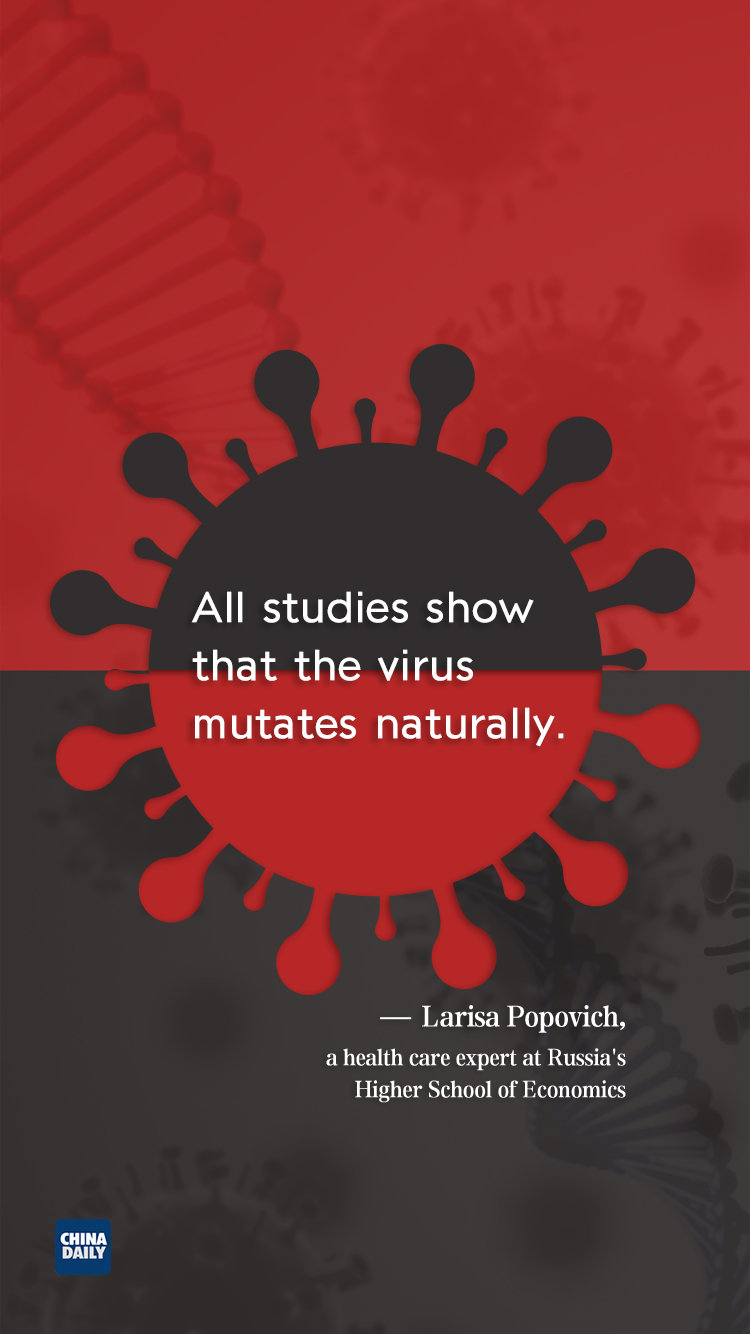
Politicizing COVID-19 origin tracing could have devastating effects on the global fight against the pandemic.
"All studies show that the virus mutates naturally. All the changes within it are natural, at least they completely fit into the mutation scheme that is known in virology," said Larisa Popovich, director of the Institute for Health Economics at Russia's National Research University Higher School of Economics.
Some new research that proves otherwise may not be devoid of political overtones, she added.
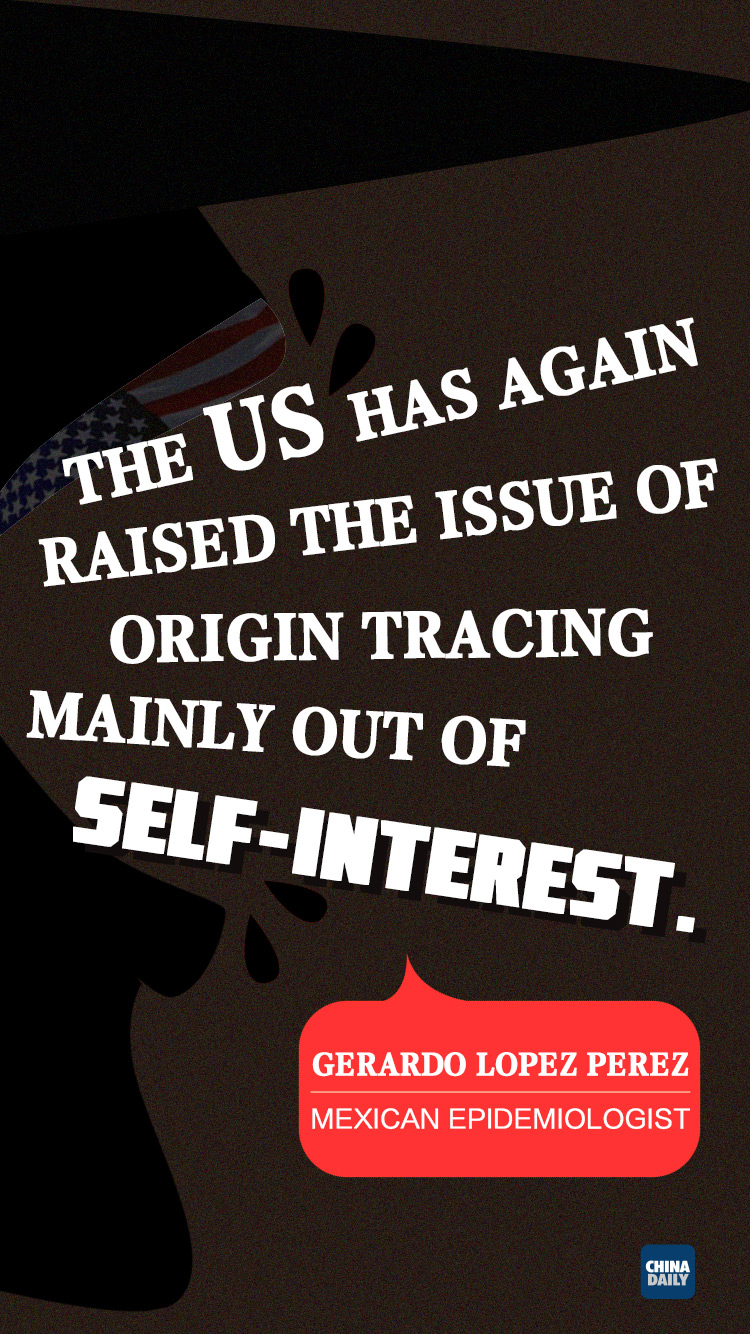
Gerardo Lopez Perez, a Mexican epidemiologist, said the United States now again raises the issue of origin tracing mainly out of self-interests.
"Generating a search for guilty right now ... is truly idle, right now what we are looking for are not guilty but solutions," he said in a recent interview with Xinhua.
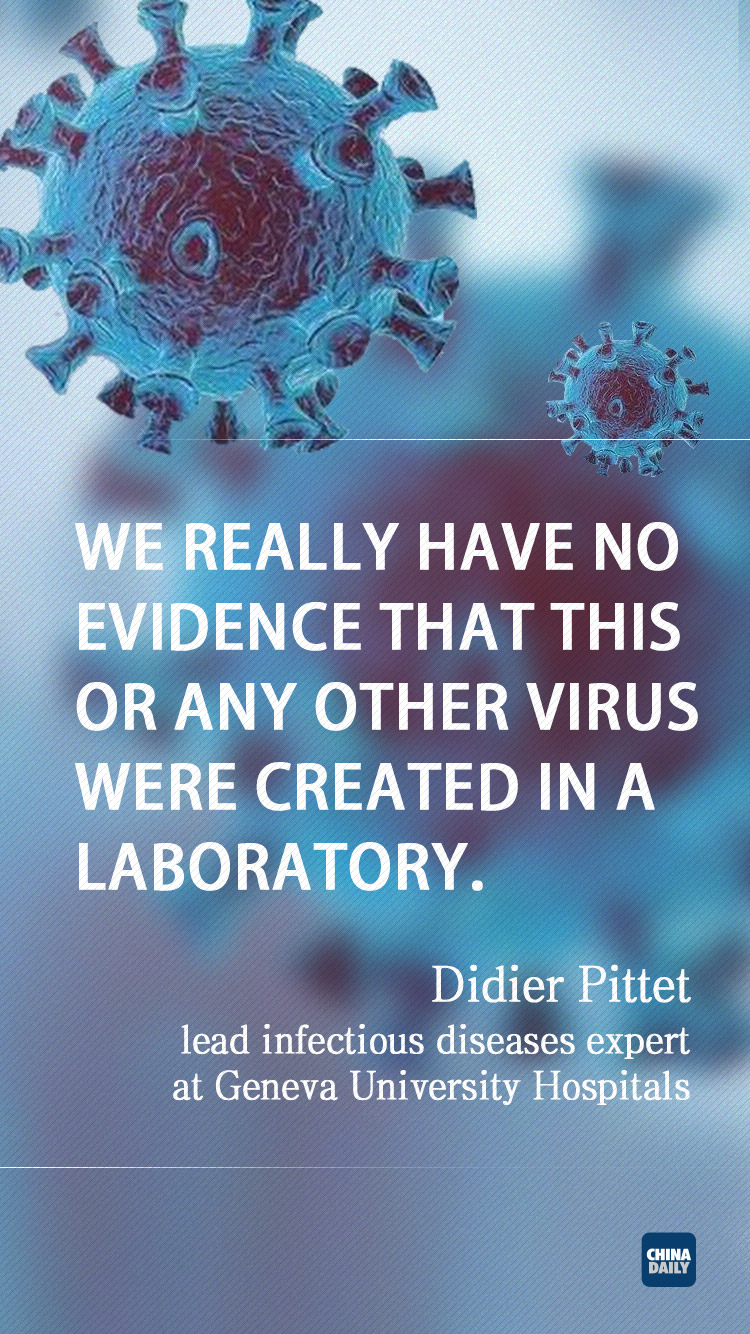
The question of whether there could be a leak of a dangerous virus from the laboratory in Wuhan "is more political in nature," said Didier Pittet, lead infectious diseases expert at Geneva University Hospitals and inventor of the hand sanitizer.
There is no evidence that the coronavirus leaked from the Wuhan laboratory, Pittet told Russia's Sputnik news agency in an interview published on July 31.
Researchers give short shrift to politically motivated theories on COVID-19 origin
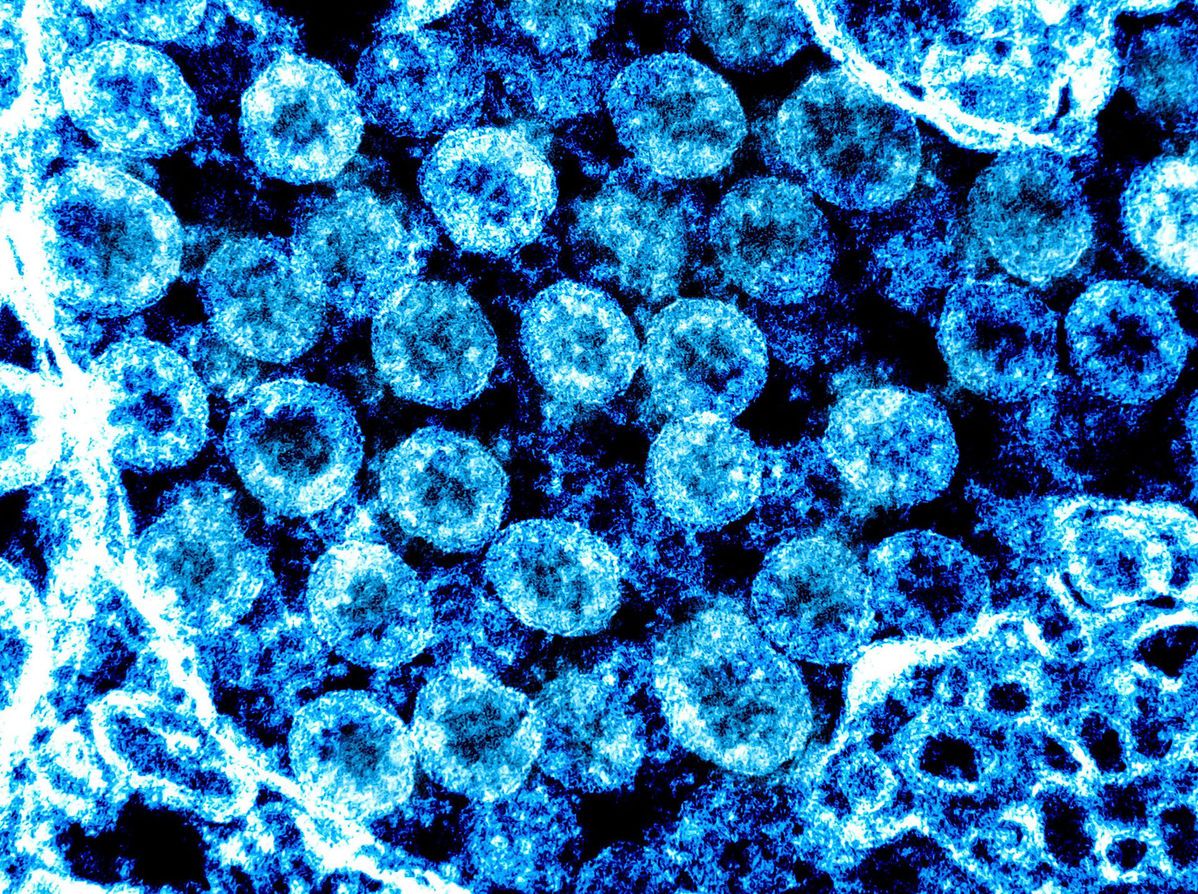
Scientists approached by China Daily would not be drawn on the politicization of COVID-19 and insist any investigation into the origins of the virus that causes the disease should be based on science.
International voices are increasing for an objective investigation while some political forces have been fixated on political manipulation and the blame game.
Ian Mackay, virologist and associate professor with the faculty of medicine at the University of Queensland, said: "I don't see how any investigation will yield anything that isn't already known. This feels like theater to me."
A joint origin-tracing study earlier this year by more than 30 experts from the World Health Organization and China ended with a report concluding that a laboratory-leak scenario was extremely unlikely.
Mackay added that in time the origins of COVID-19 will be found.
"It will take a lot more sampling of the wildlife coronavirome, genetic sequencing and virus culture to characterize many more of the coronaviruses that inhabit animals other than us, all over the world. That's where I believe we will find the likeliest culprit," he said.
Stuart Turville, an associate professor in the Immunovirology and Pathogenesis Program at the University of New South Wales' Kirby Institute, said the origins of the virus that causes COVID-19, or any virus for that matter, is "very complex".
"We need to step back from the political conversation and look at the science and based on the evidence the virus did come from an animal, most likely an animal reservoir that links the transmission from bat to human."
Australian virologist Danielle Anderson, who worked at the Wuhan Institute of Virology's Biosafety Level 4 lab until November 2019, has rejected claims about the virus leak hypothesis from the lab.
Some intelligence sources in the United States have been cited by US media to question the lab's safety and alleged its scientists were engaged in contentious gain-of-function research that manipulated viruses in a manner that could have made these more dangerous. None of these claims has ever been substantiated.
Distorted information
Distorted information has obscured an accurate accounting of the lab's functions and activities, which were more routine than how they've been portrayed in the media, Anderson said in an interview with Bloomberg.
Anderson, a leading expert on bat-borne viruses, said no one she knew at the Wuhan institute was ill toward the end of 2019. Moreover, there is a procedure for reporting symptoms that correspond with the pathogens handled in high-risk containment labs.
"If people were sick, I assume that I would have been sick-and I wasn't," she said. "I was tested for coronavirus in Singapore before I was vaccinated, and had never had it."
Not only that, many of Anderson's collaborators in Wuhan came to Singapore at the end of December 2019 for a gathering that discussed the Nipah virus. There was no word of any illness sweeping the laboratory, she said.
Sadly, Anderson's account has been largely ignored even by her own government.
Peter Collignon, of the Australian National University's Medical School and one of the country's leading experts on infectious diseases, said: "We still don't know how the COVID-19 outbreak started and its origins.
"It seems to be a bat virus that has adapted to be very effective at human transmission."
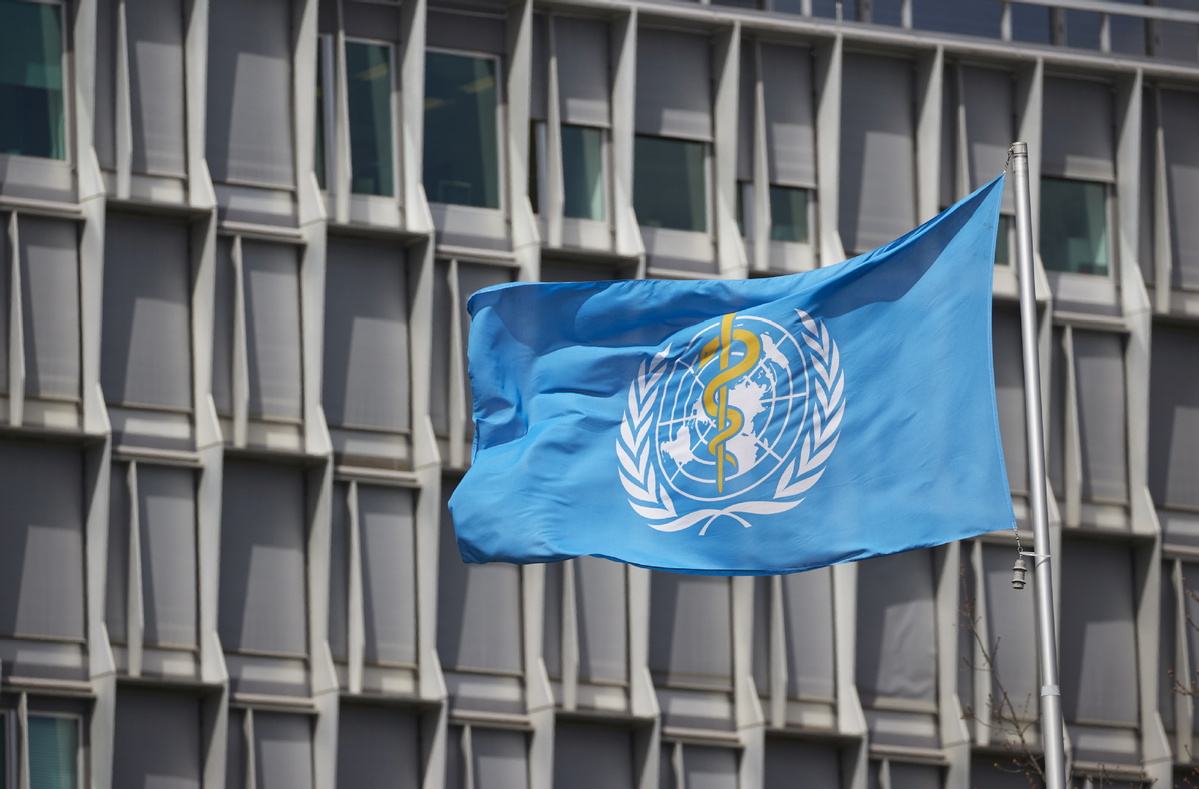
Nearly a year and half after the World Health Organization declared COVID-19 a global pandemic, efforts to contain the virus remain challenged. Many countries and territories around the world have encountered new and more deadly variants, deferring hopes for health stability and economic recovery.
At the same time, there appears to be a buildup of political acts by some countries, threatening the gains made in both pandemic origin tracing and response.
For four weeks, WHO experts and their Chinese counterparts were in Wuhan, Hubei province, the city that first reported the virus in China. The team then made recommendations and conclusions on what might have transpired, which logically would have provided a backdrop for further investigations.
However, a new plan by the WHO Secretariat to abandon those earlier outcomes of the joint study, as the WHO launches the second phase of the origin tracing investigation, has elicited strong reactions from the international community. Several questions are being raised regarding the impartiality, integrity and utility of the WHO move.
For instance, there is no scientific basis for the WHO to discount the outcomes of the joint study that was conducted by its own experts. Second, the unilateral decision by the global health body to draw up a new plan without due consultation of member states flies in the face of established rules of procedure governing execution of its mandate. Also of concern is the continuity of the source tracing, since the WHO intends to replace the experts who were involved in the Wuhan mission.
These worries have nudged more than 60 countries to write to WHO Director-General Tedros Adhanom Ghebreyesus, warning against politicization of COVID-19 source tracing, since it would have huge implications for a successful international response against the pandemic.
As a coordinating agency, the WHO should be at the forefront of building consensus in tackling global health challenges. It can only achieve this through unflinching pursuit of professionalism, independence and global good.
Besides COVID-19 source tracing, the global health body has an even more urgent responsibility: galvanizing international consensus for effective response against the pandemic. So far, developing economies have fallen behind, with a minuscule supply of vaccines, despite the widely appreciated fact that vaccines remain the most sustainable way out of the pandemic.
According to the WHO, out of the 3.5 billion vaccine doses administered around the world, 75 percent have gone to just 10 rich countries.
In the United States, nearly 50 percent of the population has been fully vaccinated, compared with around 2 percent in Africa. A country like the Democratic Republic of Congo has only administered 0.08 vaccines per 100 individuals, showing just how dire the situation is on the continent.
While rich countries offer their populations enticements to get vaccinated, people in low income economies are more willing to receive the inoculations. But the hoarding and use of vaccines to achieve political ends has derailed an equitable global response as more problematic variants take root.
A new study by the WHO and partners indicates that, had vaccine inequity been addressed, up to $38 billion could have been added to poorer nations' GDP forecast for 2021. It is these unfortunate realities that make poor countries worry about the WHO's ability to help affected countries climb out of the pandemic vortex.
The global health body should therefore focus its energies on providing solutions to the most pressing challenges, instead of falling victim to international politics. Diversionary tactics will only delay the global recovery from the health and economic crises.
The writer is a Kenya-based researcher of international relations with a focus on China-Africa ties.
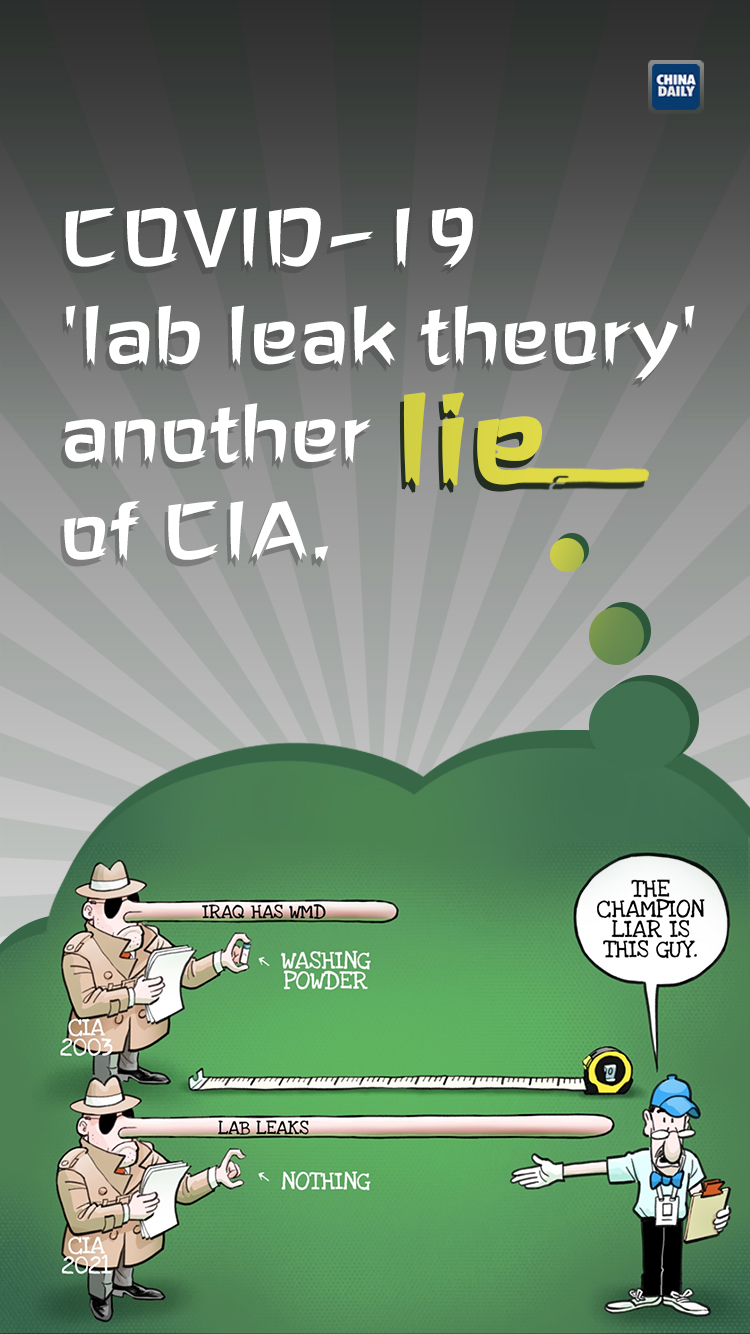
It's not the first time for the US intelligence community to lie. In 2003, the CIA accused Iraq of creating weapons of mass destruction and ignited flames of war in that country. What followed were numerous deaths of civilians and collapses of families. However, facts proved that the so-called intelligence was cooked up by the US, and the “proof” was merely a vial of detergent.
Today, by making false allegations on origin tracing of COVID-19, some US politicians are trying to trap other nations. They believe such brainwashing would make people buy the so-called lab leak theory and stigmatize China.

Amid growing calls for Fort Detrick investigation, a foreign affairs expert at a prominent US university says 'that's where all the toxins are' in a recent interview with Xinhua.
"Fort Detrick is an enormous complex; it has been for decades the center of American military research related to biology ... some of what's going on there a secret," said Stephen Kinzer, senior fellow at the Watson Institute for International and Public Affairs at Brown University.

Western nations should stop politicizing the effort to find the origins of the coronavirus, as their disregard of science can bring devastating consequences for the global fight against the pandemic, Russian officials and experts said.
At the Informal Economic Leaders' Retreat of the Asia-Pacific Economic Cooperation in early July, Russian President Vladimir Putin urged the international community to join forces in the fight against COVID-19 and speed up global vaccination efforts while reviving the economy.
At a news conference following a meeting of foreign ministers from the BRICS group of nations in June, Russian Foreign Minister Sergei Lavrov said politicians "shouldn't strive to score points and increase their popularity by speculating about the COVID-19 situation".
Prominent Russian virologists and researchers agree with this stance and have pointed to the natural origin of the virus that causes COVID-19.
"All studies show that the virus mutates naturally. All the changes within it are natural, at least they completely fit into the mutation scheme that is known in virology," said Larisa Popovich, director of the Institute for Health Economics at Russia's National Research University Higher School of Economics.
Some new research that suggests otherwise may not be devoid of political overtones, she added.
Dmitry Lvov, a Russian virologist and expert at the World Health Organization, said many of discussions about the origins of COVID-19 are not conducted by specialists and professionals in the field, but by politicians that try to pursue their own interests.
"It is difficult for me to comprehend the actions and statements that come from the WHO. Different kinds of people work there, and they are under great pressure, including from the United States," Lvov said.
Associated with bats
There is no doubt that the coronavirus has a natural origin, he said.
"I am a scientist. I don't believe hearsay. I only deal with facts. What I know is the antibodies of coronavirus have been found in people in many parts of the world before the outbreak," Lvov said, in referring to the period before the end of 2019.
In an interview with the Russia-24 news channel in May, he said coronaviruses are primarily associated with bats. "Someone could have been infected either in a room where a bat spent the night or in a cave where bats usually live in large numbers," he said.
"A person could have eaten some meat from animals that have ecological ties with bats, thus becoming the first source of infections."
Rinat Maksyutov, director-general of Russia's State Research Center of Virology and Biotechnology Vector, also said Russian experts have no doubt about the natural origin of the novel coronavirus.
Western disinformation campaigns that promote the theory of a laboratory leak in the Chinese city of Wuhan not only hinder global antivirus efforts but are intended to deflect attention from other theories, international affairs analyst Mikhail Morozov said.
Morozov said it was striking that "studies asserting the man-made nature of the coronavirus began to appear as if on command", adding that evidence for a lab-leak theory was groundless and contradictory.
"All this suggests that the West tries to use every possibility to accuse China of spreading the infection, or at least they are using the global tragedy for their own political goals or to divert attention from other theories," Morozov said.
Xinhua contributed to the story.

"The US politicization of the virus and the WHO has simply continued, with the theatrics of the Wuhan lab-leak conspiracy theory and speculation about the origin of the virus gaining new life ... as part of the ongoing American hostility against China," British writer Tom Fowdy wrote in an article published by RT.
"Amid the chaos, the findings of the WHO-led investigation in Wuhan into the origins of COVID-19 were quickly discredited because they didn't fit the US narrative," he wrote.
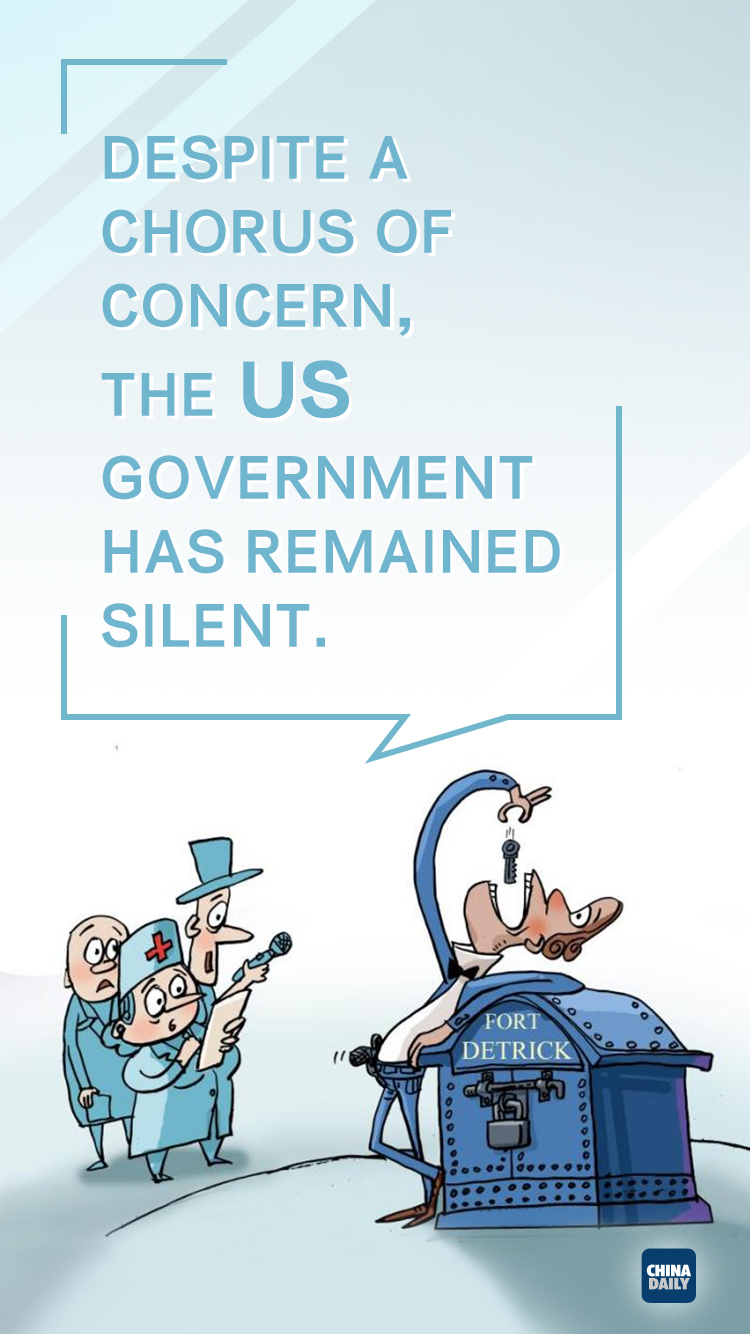
More than 20 million people have signed an online letter to the World Health Organization demanding a thorough investigation into a secretive United States laboratory tainted by a poor safety record in order to gain a better understanding of the origins of the coronavirus.
Chinese Foreign Ministry spokesman Zhao Lijian has called on the US to respond to the appeal of the Chinese netizens, and allow experts from the WHO to conduct investigations into the origin of the novel coronavirus in the US, including in the Fort Detrick lab.
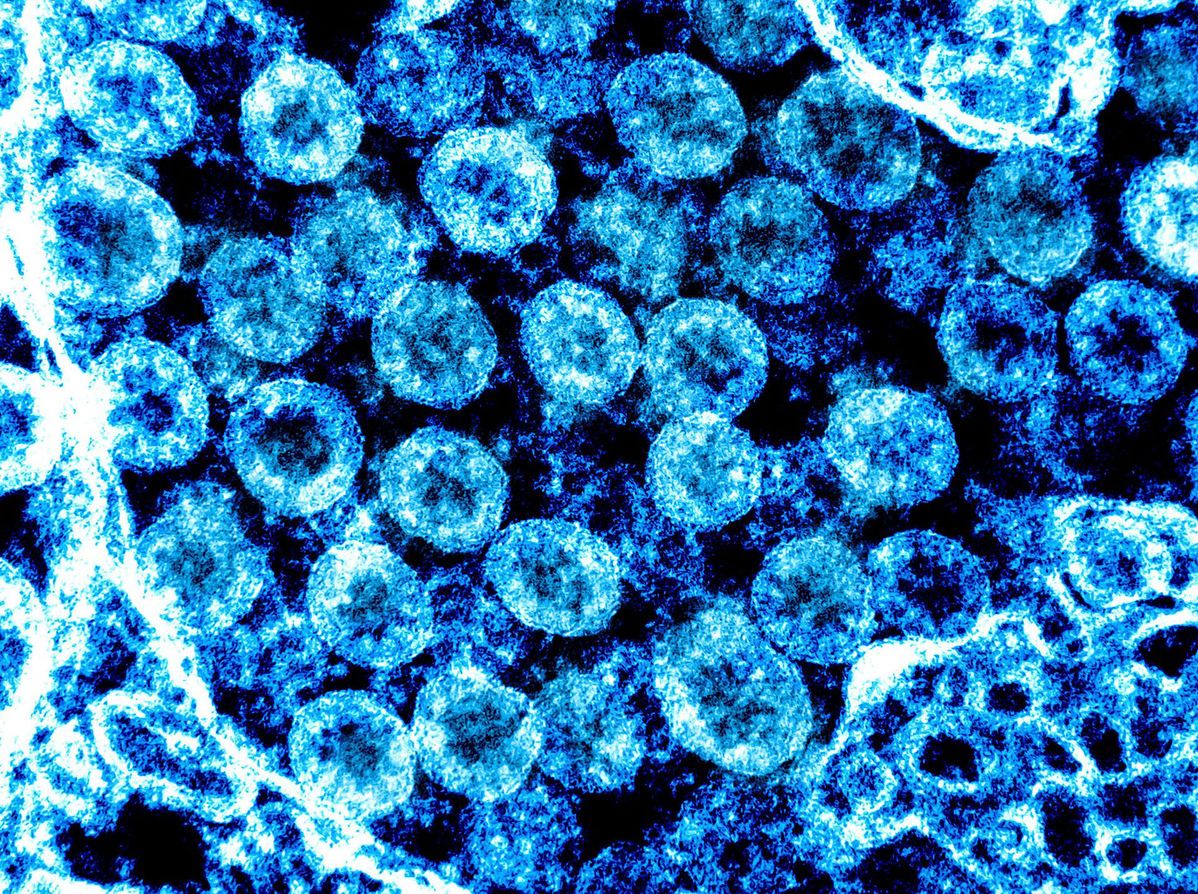
More international voices call for fair, objective COVID origin investigation
More than 300 political parties, organizations and think tanks from over 100 countries and regions submitted a joint statement on Monday to the World Health Organization Secretariat, rejecting the politicization of the COVID-19 origin study and calling for an objective, fair investigation.
Humanity lives in a community with a shared future and no country can survive major crises by itself, they said, calling for solidarity from the international community to fight the virus, which knows no boundaries or races.
However, they pointed out in the joint statement that the plan proposed by the WHO for the second phase of the origin-tracing investigation will not help to advance global cooperation on tracing the virus origins, as it is inconsistent with the resolution of the 73rd World Health Assembly, did not involve full consultation with member states, and failed to reflect the latest global research outcomes.
They called on the WHO Secretariat to carry out cooperation with member states, give full consideration to new scientific evidence and fully adopt suggestions made by the WHO-China joint report.
They also expressed support for medical experts and researchers conducting virus origin-tracing work in various countries and regions across the world in order to gain experience for preventing the next possible pandemic.
The joint statement also praised China and some other countries for actively providing vaccines to developing countries and called for capable countries to avoid restrictions on vaccine exports or hoarding.
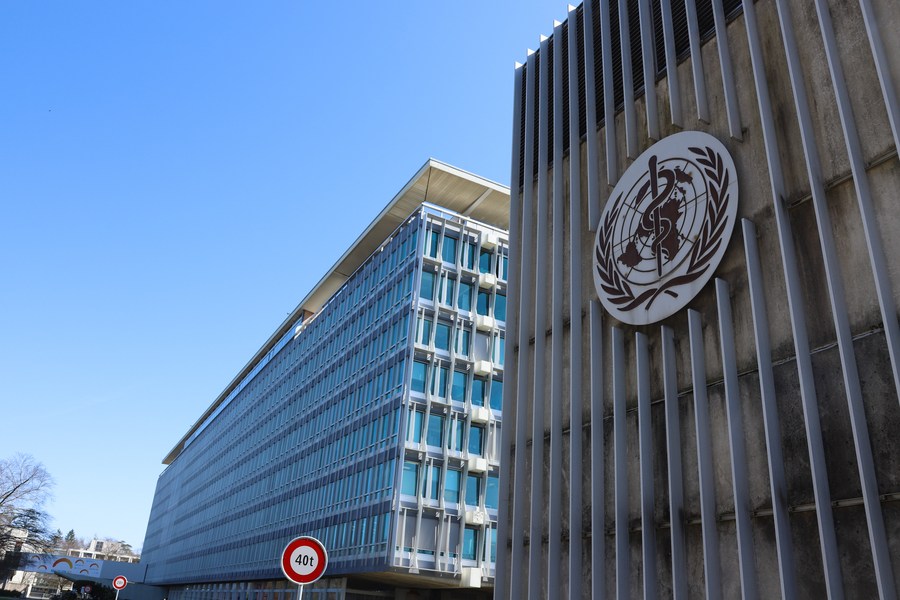
The joint statement was issued after nearly 70 countries expressed opposition to politicization of origin-tracing by writing letters to WHO Director-General Tedros Adhanom Ghebreyesus, issuing statements and sending notes.
Politicians and experts in many countries also have expressed their rejection of attempts by certain countries, including the United States, to politicize COVID-19 origin-tracing, emphasizing that the study of the origin must be based on evidence and science.
Despite the WHO-China joint report issued in March that said a "lab leak" hypothesis was "extremely unlikely", US politicians, including Secretary of State Antony Blinken, have still insisted on carrying out a virus origin probe in China.
In a statement issued on Friday, the African National Congress, South Africa's ruling party, said that it supports science-based inquiries in tracing the virus' origin of the coronavirus that causes COVID-19, calls for global cooperation and decries politicization of such inquiries.
"Only when we unite can we truly defeat the virus," it said.
Speaking at a virtual news briefing on Friday, Philippine Health Secretary Francisco Duque III said that the government shuns politicization of anything related to COVID-19.
"Whatever is being politicized by certain leaders, by certain politicians, we leave it to them," he was quoted by the Philippine News Agency as saying.
Usman Sarki, the former Nigerian deputy representative to the United Nations, told China Central Television on Friday that the US government is using the China card to address the domestic problems it faces amid the pandemic, instead of truly being interested in finding out the origin of the virus.

The novel coronavirus comes from nature, and accusations claiming a Chinese lab was the source of the pandemic are contrary to science itself, said Alexander Semyonov, head of the Yekaterinburg branch of the State Research Center of the Virology and Biotechnology Vector Institute.
The claims are groundless, and it is "pure fantasy" to think this coronavirus could be created with artificial methods, Semyonov said.
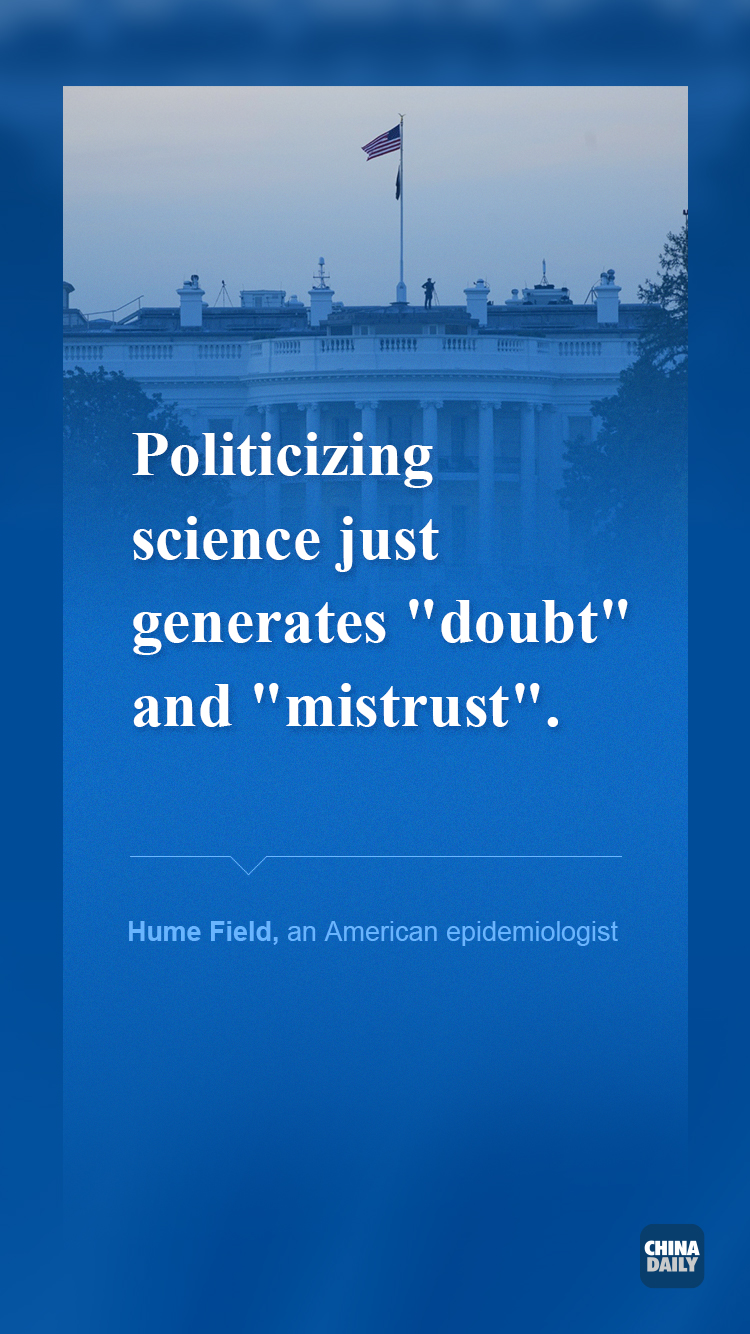
"I concur with the many scientists who say that politicizing the science does not help genuine efforts to identify the origins of SARS-CoV-2, or ongoing collaboration between Chinese and Western scientists," said Hume Field, a science and policy advisor for China and Southeast Asia at EcoHealth Alliance in New York.
It just generates "doubt" and "mistrust" and fundamentally undermines the united global effort needed to prevail against the virus and the pandemic, Field told Xinhua.
Editor's note: While scientists around the world are working together to trace the origin of coronavirus to understand more about the disease, some media outlets hyped up the so-called lab leak theory. Uninformed voices supporting coronavirus lab-leak theory lack evidence and hinder global efforts to trace the origin of the virus, says Dr. Xiaowei Jiang, a biologist from Xi'an Jiaotong-Liverpool University in an interview with CGTN anchor Wang Guan.
Wang Guan: There are two competing ideas out there: One says that coronavirus emerged from nature and the other says it was a lab leak. How likely in your opinion is it that the coronavirus was leaked from the Wuhan Institute of Virology? What evidence do we have for that?
Jiang: At the moment, there are many uninformed voices supporting a lab-leak, despite the lack of evidence. These voices are everywhere, from social media, political circles, mainstream newspapers, which is actually very bad in hampering the international collaborations to trace the origin of the virus.
So we have this review. Our review was a very clear response to that. We provided a quite comprehensive review in bringing all kinds of current scientific evidence that supports zoonotic origin of SARS-CoV-2 while addressing this misinformation supporting a lab leak.
So basically, we're saying all current evidence supports that a novel virus, such as SARS-CoV-2, which was unknown to humans before, could not have escaped from the lab.
And the emergence of the virus is similar to other zoonotic viruses such as the SARS coronavirus and HIV. The evidence review is quite comprehensive, ranging from previous experience learned from SARS coronavirus outbreak back in 2002, other viruses and epidemiology data from the early days of the pandemic in Wuhan and the final genetic and evolution evidence of the virus that the SARS-CoV-2 are evolutionarily close to.
And the molecular and genomic evidence supports the natural origin of the virus is not a laboratory construct. This is not possible from a leak from a lab.
Wang Guan: The lab leak camp also provided some scientific evidences. How should we read into them? Do you buy them?
Jiang: No. At the very beginning, they mentioned a particular short genetic code in the genome, called Furin cleavage site. We're evolutionary biologists. That's actually in our domain. So we immediately know that the particular code they claimed as evidence of engineering of the viruses is completely like a joke. Because we know that particular stretch of genetic code, they exist in other closely related coronaviruses. And from an evolutionary biologist's point of view, it's completely natural. It could be evolved in nature. There is no need for it to be engineered in the lab.
Wang Guan: Many of those so-called uninformed opinions actually come from commentators from the media, from politicians, not from the science community. Is there a consensus of some sort from the science community? If not, what are the sticking points so far?
Jiang: A lab leak could not have contributed to the emergence of the virus, considering the many levels of evidence to examine. Current scientific evidence does not support such scenario of lab escape. I think most scientists in academia, particularly us, evolutionary biologists, would think SARS-Cov-2 has a zoonotic origin. Although we still have not been able to identify the bat reservoir nor the intermediate animal host, it has no problem that SARS-CoV-2 could have evolved naturally. Studies from other scientists and us also suggested mutation - this is the change of genetic code in the virus genome; recombination - so basically, it switches a different piece of genetic code of the genome between different viruses; and natural selection, were sufficient to select for a virus highly capable of human transmission.You don't need lab engineering to do that.
Wang Guan: What are the things that made it difficult or perhaps more difficult than tracing previous viruses?
Jiang: If we know how it happened for this one, we can prevent the next one, which could be very close in the next five or 10 years. For this particular virus, the difficulties in finding the origin of the current virus is that we know that this is the second time that a virus from this genus called betacoronavirus, a subgenus sarbecovirus, this is a group of viruses which has pandemic potential, this is the second time it emerged in China and led to a pandemic.
The social and economic environment is also drasticly different, compared with the SARS coronavirus emergence in Guangdong back in 2002.
And to identify the right intermediate animal, we need to increase our sampling in the right wild or farmed animal populations which are known to be susceptible to the virus. And also to find the bat host, we need to increase our sampling across China and perhaps Southeast Asian countries. These are challenging works and may take many years to complete.
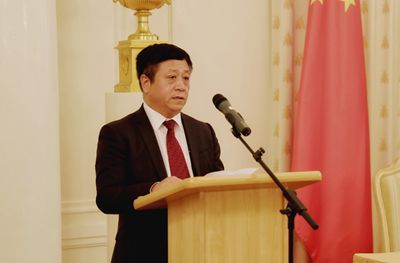
China has adhered to the principles of openness, transparency and cooperation from the very beginning in investigating the origins of the coronavirus, and has twice invited experts from the World Health Organization to visit China in support of this task, said Zhang Hanhui, the Chinese ambassador to Russia.
The United States, while closely studying the situation in other countries, has been hiding what has taken place at home, Zhang said in an interview with Russia's Interfax news agency recently.
A joint mission from China and the WHO, which examined the origins of the virus that causes COVID-19, released a report in March that drew the clear conclusion that a laboratory leak was extremely unlikely.
The US, regardless of the facts, has tried to cast doubts on the views of scientists with conspiracy theories created by its intelligence officers, thereby politicizing the issue, Zhang said.
The US has recently increased the pressure on the WHO and its director-general, Tedros Adhanom Ghebreyesus, in pushing for so-called independent and transparent investigations, Zhang said. The aim is to slander China by any means possible, the diplomat said.
The investigations into the origins of the coronavirus should be based on science and the facts, and they should also be carried out in many countries at the same time, Zhang said.
"If the US really strives for truth and transparency, it should agree to start an international investigation to identify the source of the epidemic on US soil, and the reasons for its ineffective fight against the COVID-19, as well as to answer existing questions related to the testing ground for biological experiments in the US itself," Zhang said.
The US has constantly discredited China's international image by resorting to the spreading of false information and fake news, the ambassador said.
Zhang said that Sino-US relations have gone off the right path, and are now experiencing the most difficult stage since the establishment of diplomatic ties. The main reason, he said, is that the previous US administration adhered to the outdated thinking associated with a zero-sum game.
Based on its own political needs, the administration of Donald Trump mistakenly made assessments based on misinterpretations of China's development direction and policies. It exerted pressure on China through various measures, and these actions caused serious damage to relations between the countries, Zhang said.
After the administration of President Joe Biden took over in January, Chinese President Xi Jinping and Biden held important talks by phone on the eve of the Chinese New Year, which outlined the general direction of relations between the two countries, the diplomat said.
"However at the same time, we also note that the new US administration treats China as the 'most serious rival' and continues to grossly interfere in China's internal affairs on issues related to Taiwan, Xinjiang and Hong Kong," Zhang said.
Zhang said this year marks the 50th anniversary of Henry Kissinger's secret visit to China, paving the way for diplomatic ties between the US and China. However, "it seems the US policy toward China has not yet emerged from the shadow of the policy of the previous administration", the diplomat said.
Zhang said: "We strongly urge the US to learn from history, correct the mistakes it made earlier, learn to peacefully coexist with countries with different histories, cultures and other ways of development, adhere to a constructive policy toward China, eliminate differences and return Sino-US relations to the path of healthy and stable development.
"History has proved that cooperation between China and the US is mutually beneficial, and that confrontation, on the contrary, harms the two countries."

"There's no real reason to put any weight on the possibility of a lab leak right now. We've got nothing that points to the lab other than suspicion and innuendo based on the idea of not trusting China," said Stephen Goldstein, an evolutionary biologist at the University of Utah in Salt Lake City.
Goldstein told the Salt Lake Tribune newspaper: "If you look at where the first cases in Wuhan were, there's a really striking concentration of those cases starting in the neighborhoods surrounding this market (Huanan Seafood Wholesale Market) and spreading outward from there.
"Similarly, the excess deaths observed in Wuhan begin in the part of the city that includes that market and then spread to other parts of the city."

"Based on nearly all emerging human viruses of the last 50 years (including SARS in 2003 and MERS in 2012), animals are the likely source," said Dominic Dwyer, an Australian medical virologist in the World Health Organization's COVID-19 origin-tracing joint study with China. "By virtue of their ecology, bats play a special role, not just with coronaviruses, but with Ebola, Hendra and others," said the virologist in an op-ed published in The Guardian on June 18.

NEW YORK - The second phase of investigation into the origins of COVID-19 planned by the World Health Organization (WHO) is seen as a potential campaign move by its current Director General Tedros Adhanom Ghebreyesus, who is running for a second five-year term, according to an article published in the US newspaper Politico.
Many WHO member states in Geneva were surprised by Tedros' approach to further probing whether the virus leaked from a lab, said two diplomats who asked to remain anonymous, the article said.
The diplomats see this as a potential campaign move by Tedros to align with the United States and the West for their support following criticism that the WHO was soft on China when the pandemic started, it said.
"Maybe Tedros has just done his calculations and realizes that China will not be able to block his reelection," said the second Geneva-based diplomat, according to the article.
The reelection of the director general of the WHO will take place next May.
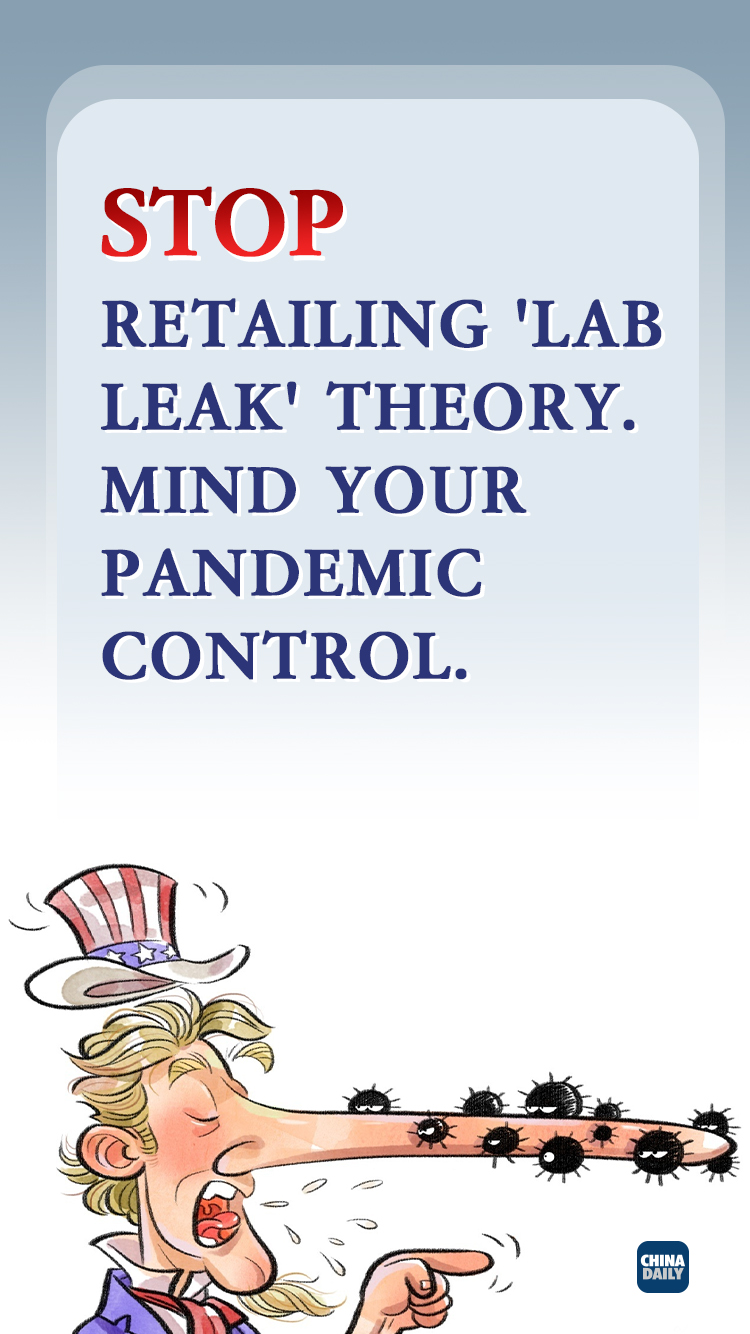
The United States is playing its old trick of smearing China, after China rejected the WHO's plan for a second phase of a study into the origin of the coronavirus.
Some people in the US ignore science and facts, hype up the "lab leak" theory and put politics above science.
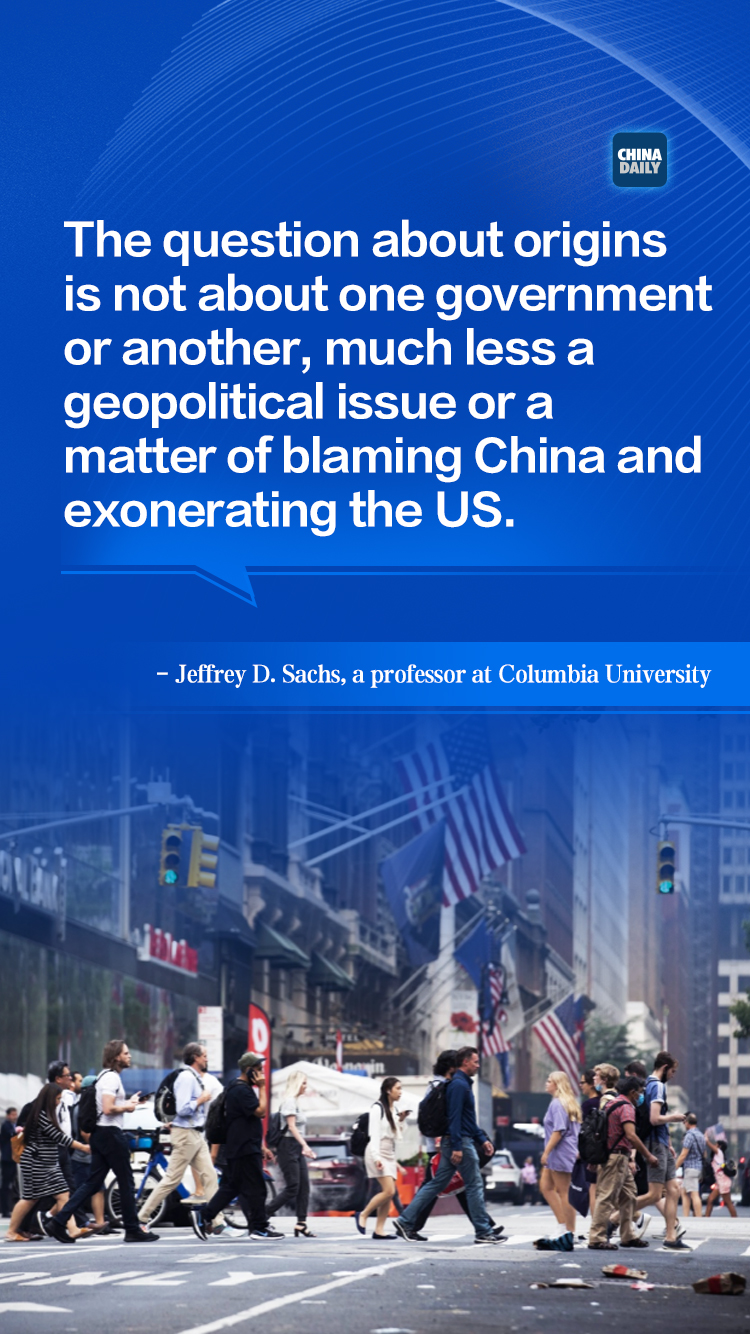
The real issue about COVID-19 origins is how to prevent future pandemics based on international cooperation, instead of blaming or acquitting some countries, said Jeffrey D. Sachs, director of the Center for Sustainable Development at Columbia University.
"The question about origins is not about one government or another, much less a geopolitical issue or a matter of blaming China and exonerating the US," Sachs wrote in an opinion article published in Project Syndicate in late June.
